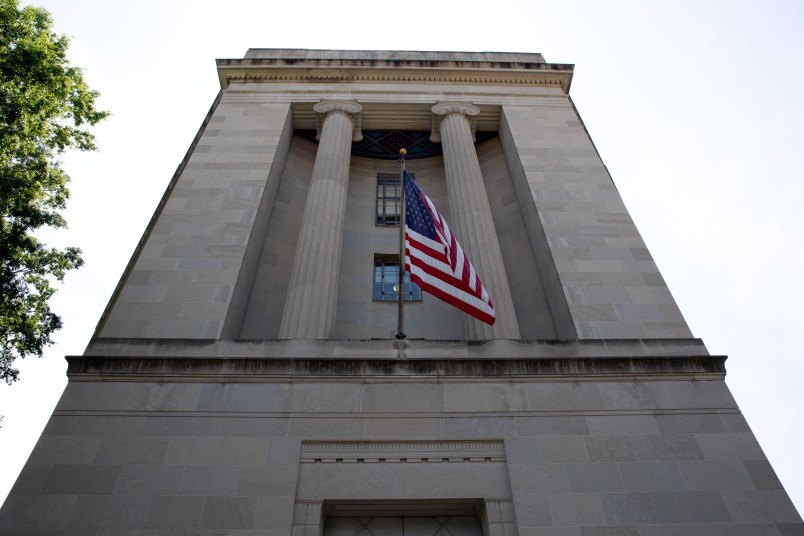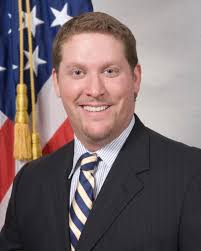A former spokesperson for the Drug Enforcement Administration and for Rep. Katherine Harris (R-FL) faked being a CIA agent and combat veteran to scam $4.4 million out of defense contractors, the Justice Department said on Thursday.
Garrison Courtney reportedly pleaded guilty at federal court in Alexandria, Virginia on Thursday to one count of wire fraud, for which he faces up to twenty years in prison.
Courtney — also a former TMZ producer — claims on his Linkedin profile to be a Communications & Marketing Executive at “Fortune 500 companies (Various).”
But according to a criminal information filed Thursday in the Eastern District of Virginia, prosecutors concluded that Courtney had spent years lying about being a CIA spy as part of an elaborate scam.
Courtney admitted in federal court on Thursday to a scheme in which he would demand that defense contractors provide him with CIA-mandated “commercial cover” — a paid role at their firms which would make him seem to be an employee in the private sector, and not a government spy.
The problem that federal prosecutors had with this arrangement was simple: Courtney is not a spy, and has never worked for the CIA.
But in the criminal information, federal prosecutors lay out a scheme in which Courtney went to amazing lengths to convince his victims that he was who he said he was — a spy — and that he was working on a secret government intelligence project which required both their help and their cash.
That fake project was called “Alpha214”: a super secret federal program to improve intelligence gathering, either to “support special operations forces of the United States operating covertly in Africa” or to help the intelligence community recover from a damaging leak.
The con was fairly simple: use the fake story to get a salary. Courtney would approach private companies and demand that they “hire and pay him to create what Courtney described as ‘commercial cover'” — demanding that the firms add him to their payrolls as a form of shielding his identity as a spy. He padded his resume with additional lies about being a Gulf War veteran with “hundreds of confirmed kills in combat.”
The former DEA spokesman would also purportedly tell the firms that they would be reimbursed by the government for his salary payments, at times in the form of contracts involving the non-existent intelligence gathering program.
When executives at the targeted companies expressed skepticism about the offer, prosecutors said that Courtney would reply that his work and identity were “highly classified.” Courtney would also demand that people sign fake non-disclosure agreements, say that foreign spies were listening in, ostentatiously search people for electronic devices, and threaten “anyone who questioned his legitimacy” with prosecution if they “leaked.”
The information details the lengths to which Courtney went to burnish his fake aura of espionage. The former DEA spokesman and onetime Seattle weatherman would demand that the people paying him as part of the scheme “limit their use of credit cards or minimize their presence on social media, purportedly to make it more difficult for foreign intelligence services to monitor those individuals’ conduct,” and would claim that foreign spies had tried to kill him by ricin poisoning.
The fake spook purportedly used real connections he had with public officials to persuade the executives of Northern Virginia defense contractors that he was the real deal. According to the criminal information, Courtney provided these officials — some of which he purportedly knew from his time at the DEA — “with talking points or other scripts regarding the supposed operation of the classified program to be used when those public officials would meet with executives of the victim companies.”
To make sure the shakedown went through, Courtney would convince the unsuspecting federal employees “to scold and even threaten corporate executives for the supposed mishandling or leaking of allegedly classified information.”
After a while, the companies’ executives would ask Courtney where the reimbursement was. Per federal prosecutors, the former DEA spokesman would then accuse the executives of being foreign spies, accusing one of being an Iranian agent.
According to the criminal information,Courtney even told an unnamed investment firm that U.S. Marshals were about to seize the company “due to alleged legal violations” by the firm’s president, but that there was a way out: if the company wired $1.95 million to another firm that Courtney told them about, it would be repaid $2.5 million and the charges would disappear.
Prosecutors say that the investment firm agreed to the arrangement. Courtney then used the funds to reimburse one of the firms he defrauded for the money it paid him.
An attorney for Courtney did not return a request for comment.
Read the criminal information here:







Could the same law be used to prosecute the Impostor in Chief?
Is that THE Katherine Harris?
Grifters gotta grift. Skills learned at the DEA, INS, and spox for GOP rep in Florida, and the early days of Homeland Security. Loves the flag and his country, yep.
Just for the full experience:

It sure is.
I’ve seen this movie. I love it when Arnold Schwarzenegger makes him piss his pants.